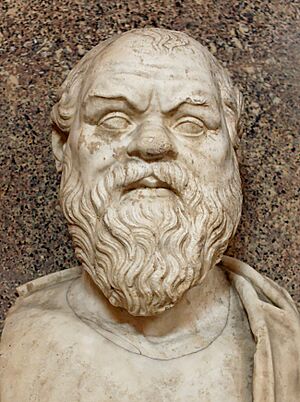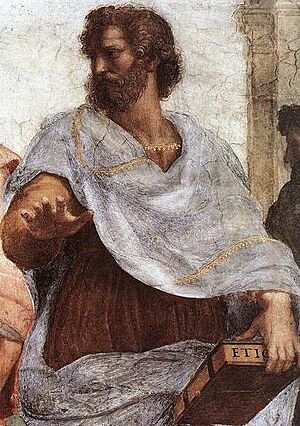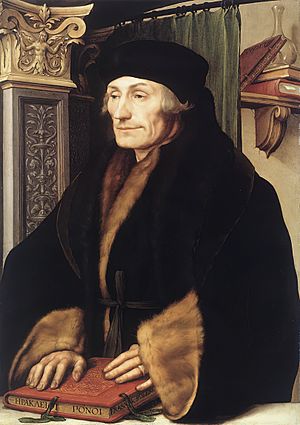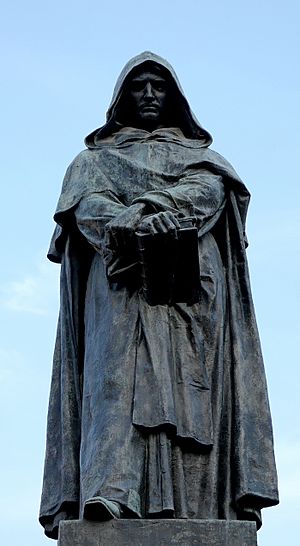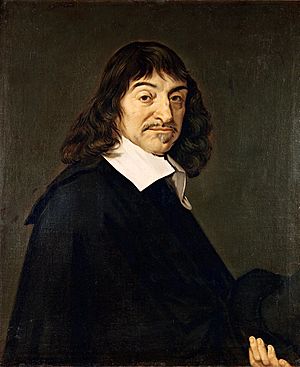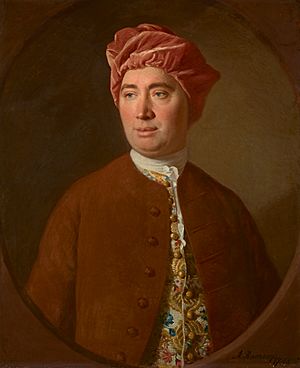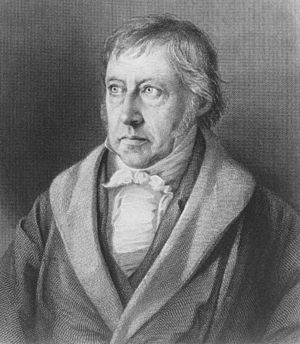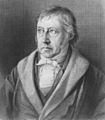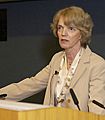Western philosophy facts for kids
Western philosophy is a way of thinking that started in Western civilization. It usually began with the ideas of ancient Greece. Most of its early growth happened in Europe and around the Mediterranean Sea.
This type of philosophy is different from Eastern philosophy. Eastern philosophy grew in Asian countries like China, Persia, Japan, India, and Korea. Sometimes, philosophical ideas from Babylon or those linked to Islam are seen as either "Eastern" or "Western."
Contents
What is Western Philosophy?
Western philosophy is a big part of Western culture. It explores important questions about life. These questions include:
- What is real?
- How do we know things?
- What is right and wrong?
- What is a good society?
People who study philosophy are called philosophers. They use logic and reason to try and answer these deep questions.
Early Thinkers: Ancient Greece
Philosophy in the West really took off in Ancient Greece. Some of the most famous early philosophers lived there.
Socrates: The Questioner
Socrates lived in Athens, Greece, around 470–399 BCE. He didn't write any books himself. We know about him from his students, especially Plato. Socrates was famous for asking many questions. He would ask people about their beliefs and ideas. This method is now called the Socratic method. He believed that understanding yourself was very important.
Plato: Ideas and Forms
Plato (c. 428–348 BCE) was a student of Socrates. He wrote many dialogues, which are like plays where characters discuss ideas. Plato believed in a world of perfect "Forms" or "Ideas." He thought that everything we see in our world is just a shadow of these perfect Forms. For example, a chair in our world is just an imperfect copy of the perfect "Form of Chair." He also founded the Academy, one of the first universities.
Aristotle: Logic and Science
Aristotle (384–322 BCE) was a student of Plato. He was a very influential thinker. Aristotle studied many subjects, including logic, biology, ethics, and politics. He focused on observing the world around him. He developed rules for logical thinking. These rules are still used today. Aristotle also taught Alexander the Great.
Philosophy in the Middle Ages
After the fall of the Roman Empire, philosophy in the West changed. It became closely linked with Christianity.
Connecting Faith and Reason
During the Middle Ages, philosophers tried to combine Greek ideas with Christian beliefs. They wanted to show that faith and reason could work together.
Augustine of Hippo (354–430 CE) was an important early Christian philosopher. He wrote about God, time, and human nature. Later, Thomas Aquinas (1225–1274 CE) was another key figure. He used Aristotle's logic to explain Christian theology.
The Renaissance and New Ideas
The Renaissance (around 1300s-1600s) brought a new focus on human beings. This period led to new ways of thinking.
Humanism and Science
Humanism became popular during the Renaissance. Humanists focused on human values and achievements. They studied ancient Greek and Roman texts. Erasmus (1466–1536) was a famous humanist.
This era also saw the rise of modern science. Thinkers like Nicolaus Copernicus and Galileo Galilei challenged old ideas. This led to new philosophical questions about knowledge and the universe.
Giordano Bruno: A Brave Thinker
Giordano Bruno (1548–1600) was an Italian philosopher. He believed the universe was infinite. He also thought there were many other worlds. His ideas were very different from what most people believed then. Sadly, he was executed for his views.
The Age of Reason: Enlightenment
The Age of Enlightenment (17th and 18th centuries) was a time of great change. People started to emphasize reason and individual rights.
René Descartes: "I Think, Therefore I Am"
René Descartes (1596–1650) was a French philosopher and mathematician. He is often called the "father of modern philosophy." Descartes famously doubted everything to find what he could be sure of. He concluded, "I think, therefore I am" (Cogito, ergo sum). This idea emphasized the importance of individual thought.
John Locke: Rights and Government
John Locke (1632–1704) was an English philosopher. He argued that people have natural rights, like the right to life, liberty, and property. He believed that governments should protect these rights. His ideas greatly influenced the American Revolution and the formation of the United States.
David Hume: Experience is Key
David Hume (1711–1776) was a Scottish philosopher. He believed that all our knowledge comes from our experiences. He was skeptical about things we can't observe. Hume's ideas challenged many traditional beliefs about cause and effect.
Immanuel Kant: Duty and Morality
Immanuel Kant (1724–1804) was a German philosopher. He tried to combine reason and experience. Kant argued that morality comes from duty. He believed we should act in ways that we would want everyone else to act. This is known as his "categorical imperative."
Modern and Contemporary Philosophy
Philosophy continued to evolve in the 19th and 20th centuries. New schools of thought emerged.
Georg Wilhelm Friedrich Hegel: History and Ideas
Georg Wilhelm Friedrich Hegel (1770–1831) was a German philosopher. He believed that history is a process of ideas developing. He thought that ideas clash and then combine to form new, better ideas. This process is called the Hegelian dialectic.
Existentialism: Freedom and Responsibility
Existentialism became popular in the 20th century. It focuses on individual freedom and responsibility. Jean-Paul Sartre (1905–1980) and Albert Camus (1913–1960) were key existentialist thinkers. They argued that we are free to choose our own meaning in life.
Analytic Philosophy: Logic and Language
Analytic philosophy focuses on logic, language, and science. It became very important in the 20th century. Bertrand Russell (1872–1970) was a leading figure. He worked on logic and the foundations of mathematics.
Feminist Philosophy: Gender and Society
Feminist philosophy looks at how gender affects our understanding of the world. It questions traditional ideas about power and society. Simone de Beauvoir (1908–1986) and Judith Butler (born 1956) are important feminist philosophers.
Why Study Western Philosophy?
Studying Western philosophy helps us understand how people have thought about big questions for centuries. It teaches us to think critically. It also helps us understand the ideas that shaped Western society, science, and politics.
Images for kids
-
Aristotle in The School of Athens, by Raphael
-
Map of Alexander the Great's empire and the route he and Pyrrho of Elis took to India
-
Erasmus is Credited as the Prince of the Humanists
-
Bronze statue of Giordano Bruno by Ettore Ferrari, Campo de' Fiori, Rome
-
Portrait of René Descartes, after Frans Hals, second half of 17th century
-
Portrait of David Hume, by Allan Ramsay, 1754
-
Georg Wilhelm Friedrich Hegel, steel engraving, after 1828
-
Patricia Churchland, 2005
-
Edmund Husserl, in the 1910s
-
William James in 1906
See also
 In Spanish: Filosofía occidental para niños
In Spanish: Filosofía occidental para niños
 | Delilah Pierce |
 | Gordon Parks |
 | Augusta Savage |
 | Charles Ethan Porter |


